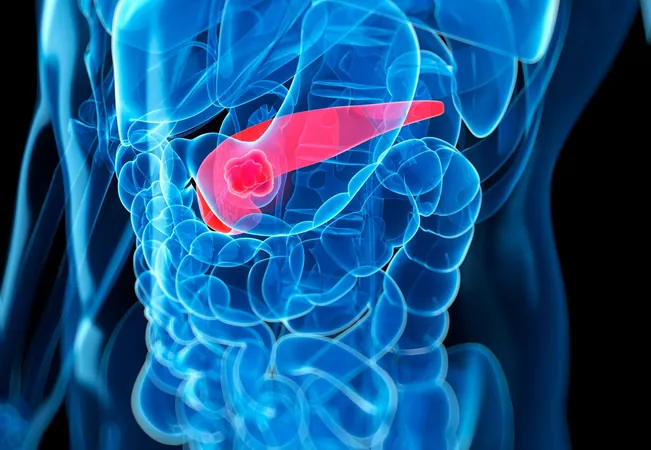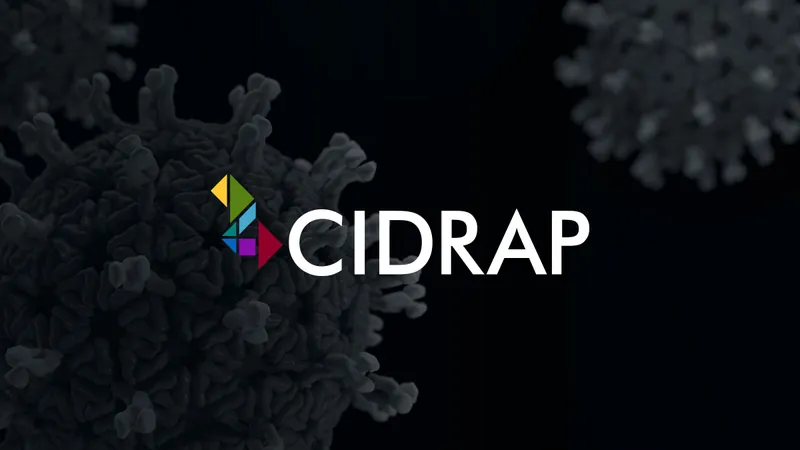
Innovative Research Reveals How Inhibiting FGFR2 Offers Hope Against Deadly Pancreatic Cancer
2025-04-03
Author: Wei
Groundbreaking Research on Pancreatic Cancer
In a groundbreaking study, researchers have unveiled a new approach that could prevent and delay the onset of pancreatic ductal adenocarcinoma (PDAC), the most common and deadly form of pancreatic cancer. This cancer type often stems from precancerous lesions that, despite being prevalent, only a small fraction progress to PDAC.
Key Findings in FGFR2 and PDAC
Published in the scientific journal *Cancer Research*, the research led by Dr. David Tuveson, a prominent figure in cancer studies at Cold Spring Harbor Laboratory (CSHL), focuses on the role fibroblast growth factor receptor 2 (FGFR2) plays in the progression of PDAC in mice genetically modified to mimic KRAS mutations—widely recognized as one of the key drivers of many cancers, including pancreatic.
Researchers discovered that FGFR2 was expressed at higher levels in KRAS-mutated precancerous lesions and PDAC when compared to normal tissues. This elevation in FGFR2 was associated with increased signaling from the mutant KRAS, hinting at an interactive relationship that could fuel cancer progression.
Promising Experimental Results
The experiments revealed promising results: the deletion of the FGFR2 gene led to a significant reduction in the number of precancerous lesions and delayed the formation of tumors in comparison to mice with an intact FGFR2 gene. Moreover, a combined approach targeting both FGFR2 and epidermal growth factor receptor (EGFR) showed remarkable efficacy in reducing precancerous lesions in the KRAS-mutated mice.
Significance of Targeting FGFR2
Dr. Claudia Tonelli, lead author of the study, emphasized the pivotal role of FGFR2 in the transition from precancerous lesions to maligned cancers. She stated, "Our findings suggest that targeting FGFR2 could be crucial in preventing the progression of high-risk precancerous lesions to full-blown PDAC.”
Beyond KRAS Mutations
Interestingly, while KRAS mutations are known to initiate pancreatic cancer, they alone are insufficient to drive the transition from a harmless lesion to a malignant tumor. Dr. Tonelli noted that this suggests there are additional pathways at play that could be targeted for therapeutic intervention.
Therapeutic Potential of FGFR Inhibitors
The potential for FGFR inhibitors, which are already available in clinical settings, to intercept the development of PDAC is an exciting prospect. However, Dr. Tonelli cautioned that their effectiveness in this new role must first undergo rigorous clinical trials before becoming a standard treatment option.
Future Research and Implications
The implications of this research extend beyond immediate preventative strategies. Dr. Tuveson’s lab is engaged in multiple ongoing projects that analyze changes in cellular metabolism in pancreatic tumors, delve into signaling pathways initiated by the Ras oncogene, and identify novel biomarkers for early detection of pancreatic cancer. They have also established a diverse range of organoid models derived from human patients to test therapeutic sensitivities and develop new treatment strategies.
Conclusion and Outlook
As the research community peers deeper into the oncogenic intricacies of pancreatic cancer, this study offers a beacon of hope not merely for delaying progression but potentially for effective interception strategies, which could ultimately save lives by preventing PDAC before it has a chance to develop. With further exploration, we may soon witness transformational breakthroughs in the battle against one of cancer’s most formidable adversaries.
Stay tuned for more updates, as this research continues to reshape our understanding of pancreatic cancer and its treatment!




 Brasil (PT)
Brasil (PT)
 Canada (EN)
Canada (EN)
 Chile (ES)
Chile (ES)
 Česko (CS)
Česko (CS)
 대한민국 (KO)
대한민국 (KO)
 España (ES)
España (ES)
 France (FR)
France (FR)
 Hong Kong (EN)
Hong Kong (EN)
 Italia (IT)
Italia (IT)
 日本 (JA)
日本 (JA)
 Magyarország (HU)
Magyarország (HU)
 Norge (NO)
Norge (NO)
 Polska (PL)
Polska (PL)
 Schweiz (DE)
Schweiz (DE)
 Singapore (EN)
Singapore (EN)
 Sverige (SV)
Sverige (SV)
 Suomi (FI)
Suomi (FI)
 Türkiye (TR)
Türkiye (TR)
 الإمارات العربية المتحدة (AR)
الإمارات العربية المتحدة (AR)